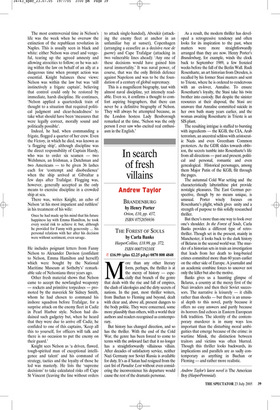In search of fresh villains
Andrew Taylor
BRANDENBURG by Henry Porter Orion, £10, pp. 437, ISBN 0752856936 THE FOREST OF SOULS by Carla Banks HarperCollins, £18.99, pp. 372,
ISBN 000719210X
✆ £16.99 (plus £2.25 p&p) 0870 800 4848 More than any other literary form, perhaps, the thriller is at the mercy of history — especially that branch of the genre that deals with the rise and fall of empires, the clash of ideologies and the dirty secrets of nations. In the past, most thriller writers, from Buchan to Fleming and beyond, dealt with clear and, above all, present dangers to the body politic. They were concerned, some more plausibly than others, with a world their authors and readers recognised as contemporary.
But history has changed direction, and so has the thriller. With the end of the Cold War, the genre has been forced to come to terms with the awkward fact that it no longer has a straightforwardly villainous villain. After decades of satisfactory service, neither Nazi Germany nor Soviet Russia is available for duty. It’s as if Satan had resigned from the cast list of Paradise Lost without even considering the inconvenience his departure would cause the rest of the dramatis personae. As a result, the modern thriller has developed a retrogressive tendency and often looks for its inspiration to the past, when matters were more straightforwardly arranged than they are now. Henry Porter’s Brandenburg, for example, winds the clock back to September 1989, a few frenzied weeks before the fall of the Berlin Wall. Rudi Rosenharte, an art historian from Dresden, is recalled by his former Stasi masters and sent to Trieste, where he is ordered to rendezvous with an ex-lover, Annalise. To ensure Rosenharte’s loyalty, the Stasi take his twin brother into custody. But despite the sinister resources at their disposal, the Stasi are unaware that Annalise committed suicide in her own bath many years earlier, and the woman awaiting Rosenharte in Trieste is an SIS plant.
The resulting intrigue is stuffed to bursting with ingredients — the KGB, the CIA, Arab terrorism, an ancestral schloss with aristocratic Nazis and even Greenham Common protesters. As the GDR slides towards oblivion, the secrets tumble into Rosenharte’s life from all directions — past and present, political and personal, romantic and even genealogical. Historical personages, among them Major Putin of the KGB, flit through the pages.
The autumnal Cold War setting and the characteristically labyrinthine plot provide nostalgic pleasures. The East German perspective, though by no means unique, is unusual. Porter wisely focuses on Rosenharte’s plight, which gives unity and a strength of purpose to this solidly researched thriller.
But there’s more than one way to look over one’s shoulder. In the Forest of Souls, Carla Banks provides a different type of retrothriller. Though set in the present, mainly in Manchester, it looks back to the dark history of Belarus in the second world war. The murder of a historian sets in train an investigation that leads from her death to long-buried crimes committed more than 60 years earlier on the other side of Europe. A journalist and an academic combine forces to uncover not only the killer but also the motive.
Banks gives us a haunting glimpse of Belarus, a country at the mercy first of the Nazi invaders and then their Soviet successors. The narrative is leisurely — it chills rather than shocks — but there is an unusual depth to this novel, partly because it offers no easy answers and partly because its horrors find echoes in Eastern European folk tradition. The identity of the contemporary murderer is in many ways less important than the disturbing moral ambiguities that emerge because of the crime: in wartime Minsk, the distinction between traitors and victims was often blurred. Though this thriller looks backwards, its implications and parallels are as sadly contemporary as anything in Buchan or Fleming — and rather more realistic.















































 Previous page
Previous page